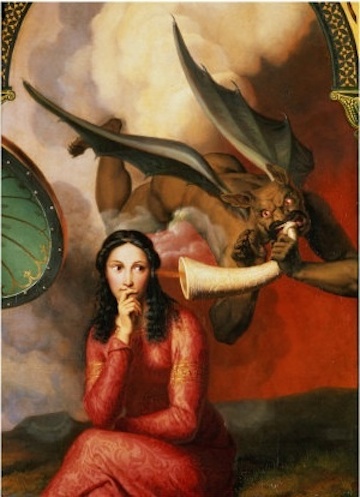C. S. Lewis’ The Screwtape Letters are about the ways the diabolic mind counters God’s grace and truth. Robert Reilly, in his new book, Making Gay Okay, remarks that often we are content to lie to ourselves about what is, about what we do and hold. The first citation in the Reilly book is from Malcolm Muggeridge: “People do not believe lies because they have to, but because they want to.” That passage pretty well sums up what the devilish mind seeks to establish in us; that is, a willingness to lie about even the most obvious truths, if they go counter to what we want.
In Letter XIV, Screwtape explains to his devil apprentice how the divine mind works. The subject is humility, a high-level virtue. To be humble is to acknowledge real things, including ourselves, as they are. But what exists in each thing is its goodness. The devil wants us to use what humility we have to call attention to ourselves, not to the thing out there which we acknowledge as it is. The falsely humble man, however, implicitly says “Oh, look at me,” while telling everyone at the same time how unworthy he is.
The teacher devil explains that the divine mind (“the Enemy” to the devil) wants to find a truly humble man (not unlike Aristotle’s magnanimous man). He is one who “could design the best cathedral in the world, and know it to be the best, and rejoice in the fact, without being any more (or less) glad at having done it than he would be if it had been designed by another.” This devil is a pretty good teacher of Christianity, I must say.
“The Enemy” (that is, God) “wants each man, in the long run, to be able to recognize all creatures (even himself) as glorious and excellent things.” Notice that two things are involved here: 1) a glory and excellence exist in real things, and 2) we can and ought to recognize and state this glory and excellence.
Now, what puzzles and annoys Screwtape is how “the Enemy” wants to make these human creatures, sometimes referred to as “vermin” by the devil clan, more charitable and grateful by destroying their self-love, which gets in their way. This is why the diabolic policy is always to increase self-love so that everything is not seen for what it is, but as something that merely calls attention to oneself. Only when one of these human varmints can love his neighbor as himself can he finally figure out what it means to love himself. Each person, after all, is also a good created by God, not himself.

There was a theory, which Lewis mentions early in the book, that the reason for the hatred of the fallen angels for both God and mankind was because the angels had some sort of vision of the Incarnation. This reality meant that God became man. Not a few of the devils, led by one Lucifer, a particularly bright one, thought this was too much and rebelled. Once they were tossed out of their original situation, they spend their time trying to confuse and deflect human beings from achieving their own ultimate purpose, which is also, with the angels, to share in the eternal inner life of the triune Godhead. Some such reasoning is probably why St. Paul told us that our main struggle is not against flesh and blood but against “principalities and powers.” (Ephesians, 6:11)
Thus, Screwtape understands much of the policy of “the Enemy.” He knows how He goes about guiding mankind through virtue, prayer, and truth. But Screwtape still cannot get what “the Enemy” sees in these lowly human types. To his nephew, Wormwood, he complains: “For we must never forget the most repellent and inexplicable trait in our Enemy. He really loves the hairless biped he has created.” Somehow, I always smile when I read that description of our kind – the hairless bipeds. Screwtape cannot figure out how anybody, let along God, could stoop so low.
The devil’s problem, as Lewis implies, is also a lack of humility. He is unwilling to recognize the goodness in anything. This reluctance is really pride. He insists that the only good is the good he calls good, not the good that is good, and, on this basis, what we designate it as such.
But when God (“the Enemy”) really loves the “hairless biped,” He still leaves him the dignity of his freedom. He allows man not to reciprocate His love for him. Man can look squarely at the good, even his own good. He can deny that it has any origin that he needs to recognize or respond to.
In the end, many a hairless biped does not even recognize the good that is himself. Though he need not, he lies to himself about himself.















